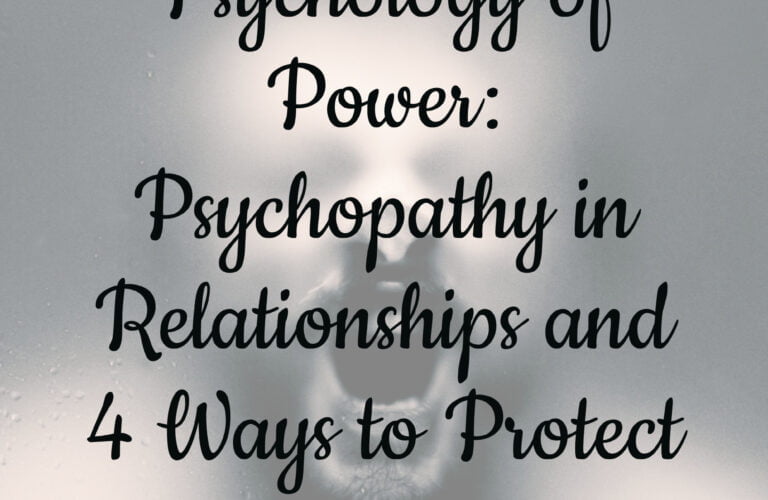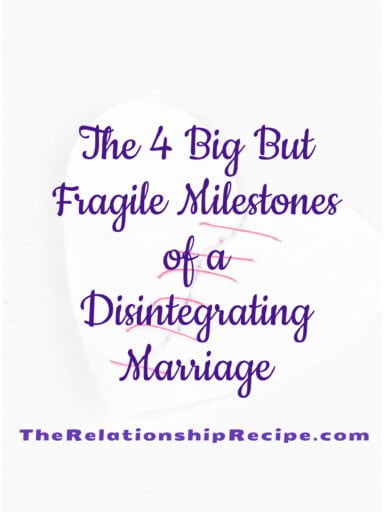My journey into the abyss began with the discovery of the psychopathic trait within my partner
The Dark Triad of Psychopathy in Romantic Relationships
As I reflect on the harrowing journey I’ve undertaken, escaping the grip of a relationship marked by the disturbing presence of the Dark Triad, the memories are as vivid as the scars it left behind. It’s an experience that has reshaped my understanding of relationships, illuminating the malevolent traits that compose the Dark Triad—psychopathy, narcissism, and Machiavellianism.
I invite you to make your way through the entanglement of a relationship tainted by psychopathy, exploring this area of the Dark Triad and, more importantly, how to emerge from its shadows a stronger person.
Defining the Dark Triad
The Dark Triad is a trifecta of personality traits—psychopathy, narcissism, and Machiavellianism—that collectively encapsulate a malevolent, manipulative, and callous approach to interpersonal relationships.
My journey into the abyss began with the discovery of the psychopathic trait within my partner—a revelation that unveiled a complex tapestry of deception, lack of empathy, and a proclivity for exploiting others.

What are Dark Triad Traits?
- Psychopathy: The Abyss Within:
- Psychopathy, as a dark triad trait, is characterized by a lack of empathy, remorse, and a penchant for deceit. My partner’s seemingly charming exterior masked an emotional void, an absence of genuine connection that left me grappling with the realization that the person I thought I knew was merely a facade. More information on the traits in a minute.
- Narcissism: The Reflective Mirage:
- Within the dark triad, narcissism manifests as an overwhelming self-centeredness, an insatiable need for admiration, and a distinct lack of empathy for others. Living under the shadow of a narcissist meant navigating a relationship where my needs and feelings were systematically disregarded.
- Machiavellianism: The Puppeteer’s Strings:
- Machiavellianism, the third facet of the dark triad, involves manipulation, cunning, and a strategic approach to relationships. Unbeknownst to me, my partner was a master puppeteer, orchestrating scenarios that served his interests while leaving me in a web of confusion and despair.
Understanding the Psychopath’s Sense of Self
A psychopath’s sense of self is a fragmented, distorted narrative woven with deception. Beneath the charming facade lies an individual devoid of authentic emotions, forming relationships not out of genuine connection but as a means to an end. This revelation plunged me into a tumultuous sea of disbelief, as I grappled with the realization that the love and connection I sought were mere illusions.

What are Traits of Psychopathy in Relationships?
Psychopathy is characterized by a set of personality traits and behaviors that can manifest in various areas of life, including romantic relationships. It’s important to note that while some individuals may exhibit psychopathic traits, it doesn’t necessarily mean they have a full-blown psychopathic personality disorder. Here are some traits often associated with psychopathy in romantic relationships:
- Superficial Charm:
- Psychopaths are often charming and charismatic. They can be adept at creating a positive first impression, drawing people into romantic relationships through their engaging demeanor.
- Lack of Empathy:
- One of the hallmark traits of psychopathy is a profound lack of empathy. Psychopaths struggle to understand and connect with the emotions of others, making it challenging for them to truly empathize with their romantic partners.
- Manipulative Behavior:
- Psychopaths are skilled manipulators. In romantic relationships, they may use manipulation to control their partner’s emotions, actions, or decisions for their personal gain.
- Deceptive Nature:
- Psychopaths are typically pathological liars. They may create elaborate stories or deceive their romantic partners to maintain a particular image or to achieve their goals within the relationship.
- Shallow Emotional Responses:
- Psychopaths may display shallow or limited emotional responses. While they may mimic appropriate emotional reactions, their feelings are often superficial, lacking depth or authenticity.
- Lack of Remorse:
- Psychopaths typically lack genuine remorse or guilt for their actions. In romantic relationships, this can manifest as a disregard for the emotional consequences of their behavior on their partner.
- Impulsivity:
- Psychopaths frequently engage in impulsive behaviors without considering the potential consequences. This impulsivity can affect decision-making within the relationship, leading to erratic actions or sudden changes.
- Promiscuity:
- Psychopaths may engage in promiscuous behavior within romantic relationships. Their lack of emotional connection and impulse-driven nature can contribute to infidelity or a disregard for commitment.
- Grandiosity:
- A sense of grandiosity is common in psychopaths. They may have an inflated sense of self-worth, believing they are superior to others. In romantic relationships, this can lead to a lack of appreciation for their partner’s needs and feelings.
- Cunning and Manipulative Tactics:
- Psychopaths may employ cunning tactics to control and dominate their partners. This could involve gaslighting, triangulation, creating confusion, or exploiting vulnerabilities for personal gain.
It’s essential to approach the identification of psychopathy cautiously, as not everyone who exhibits certain traits is a psychopath. Moreover, the presence of these traits doesn’t guarantee a psychopathic personality disorder diagnosis.
If you suspect someone may be exhibiting psychopathic traits, it is advisable to seek professional advice and support, such as consulting with a mental health professional or therapist. They can provide a comprehensive assessment and guidance on how to navigate relationships with individuals displaying such traits.

Distinguishing Between Psychopathy and Sociopathy:
While psychopathy and sociopathy share overlapping traits, they diverge in their origins and expressions. The triad of a sociopath, encompassing impulsivity, lack of remorse, and erratic behavior, can overlap with psychopathy, but the key difference lies in the sociopath’s tendency to act on impulse without forethought. My journey taught me that understanding these nuances is crucial for identifying the specific traits at play in a tumultuous relationship.
Protecting Yourself from the Dark Triad
- Educate Yourself:
Knowledge is a powerful shield. Arm yourself with an understanding of the dark triad traits to recognize the warning signs before falling prey to manipulation.
In the realm of romantic relationships, understanding the traits explained in this article associated with psychopathy becomes an indispensable shield against potential emotional turbulence. Armed with this knowledge, embarking on romantic journeys can discern the subtle cues that may indicate a psychopathic presence.
Recognizing the signs early on empowers individuals to protect themselves from potential manipulation. Knowledge acts as a preemptive defense, allowing individuals to navigate the complexities of romantic connections with a discerning eye, allowing for emotional well-being while guarding against the potential pitfalls associated with psychopathy in relationships.
2. Trust Your Intuition:
Intuition often serves as an early-warning system. If something feels amiss, trust your instincts and investigate further. In the often confusing realm of relationships, intuition acts as a vital compass, guiding individuals through the nuances of emotional connections. Particularly in the context of psychopathy, where subtle manipulations may lurk beneath the surface, trusting one’s intuition becomes paramount.
If a relationship triggers a sense of unease or if something seems off-kilter, relying on those intuitive signals can serve as an early-warning system. Investigating further and validating those gut feelings can be instrumental in identifying potential psychopathic traits. Trusting your intuition in matters of the heart is not merely a subjective inclination; it’s a proactive step towards safeguarding emotional well-being and maintaining a healthy relationship dynamic.
3. Establish Boundaries:
Define clear boundaries and communicate them assertively. Psychopaths thrive on blurring lines; maintaining steadfast boundaries can safeguard your emotional well-being.
In interpersonal dynamics, establishing clear boundaries emerges as a crucial strategy, especially when navigating relationships with individuals who may exhibit psychopathic traits.
Psychopaths often excel at blurring lines and manipulating emotions, making it imperative to define and communicate boundaries assertively. These boundaries serve as protective shields, delineating the limits of acceptable behavior and guarding against potential emotional manipulation.
By articulating and upholding these boundaries, individuals empower themselves to maintain a sense of autonomy, creating a healthier relationship dynamic while deterring the subtle manipulations that psychopaths may employ. In essence, establishing boundaries becomes a proactive measure, preserving one’s emotional well-being within the complex landscape of relationships.
4. Seek Support:
Share your experiences with friends, family, or a therapist. The dark triad operates more effectively in isolation, and seeking support can provide a lifeline in challenging times.
When grappling with the complexities of relationships tainted by psychopathic traits, seeking support becomes a pivotal step in reclaiming emotional well-being. The dark triad’s potency often thrives in isolation, rendering its effects more impactful when victims navigate these challenging dynamics alone.
By sharing experiences with friends, family, or a therapist, individuals create a vital support system that serves as a counterforce to the isolating tactics employed by psychopaths. External perspectives can provide clarity, validation, and emotional reinforcement, empowering individuals to navigate the intricate web of a relationship tainted by psychopathy.
In essence, seeking support becomes an antidote to the toxic effects of isolation, offering a lifeline while enabling resilience in the face of manipulation.

Realizing You’re in a Relationship with a Psychopath
- Acknowledge the Signs:
- The first step is recognizing the signs—a lack of empathy, manipulation, and a consistent pattern of deceit. Once acknowledged, the path to healing can begin.
- Protect Yourself:
- Safeguard your emotional and mental well-being. Establishing distance and seeking professional help can provide the support needed to navigate the complexities of leaving a psychopathic relationship. Take the above steps to be on the road to emotional self protection.
What are the Long Term Effects of a Relationship with a Psychopath?
Enduring a relationship with a psychopath can leave profound and lasting effects on an individual’s mental, emotional, and sometimes physical well-being. The insidious nature of psychopathy, marked by manipulation, deceit, and emotional abuse, often takes a toll that extends well beyond the relationship itself.
One enduring impact is the erosion of self-esteem and confidence. Psychopaths excel at exploiting vulnerabilities, leaving victims questioning their own worth and capabilities. The constant gaslighting and emotional manipulation create a distorted self-perception, contributing to long-term feelings of inadequacy.
Trust, once shattered, becomes a challenging aspect to rebuild. Psychopathic relationships are often rife with betrayal, deceit, and breaches of trust. Individuals who have endured such relationships may find it difficult to trust others in subsequent connections, whether romantic or otherwise. The scars of past betrayals linger, impacting the ability to form healthy, trusting relationships. Rebuilding trust requires a concerted effort, often involving therapy, self-reflection, and a commitment to healing.
The aftermath of a psychopathic relationship may manifest in heightened anxiety and hypervigilance. Survivors often grapple with lingering fear, anticipating potential threats or manipulative behaviors from others.
The trauma experienced during the psychopathic relationship can trigger long-term anxiety disorders and persistent hypervigilance as individuals navigate the aftermath. Coping with these effects often necessitates therapeutic intervention, support networks, and a patient commitment to self-care and healing.
Escaping the clutches of a relationship marred by the dark triad was a journey of pain, self-discovery, and ultimately, resilience. By unraveling the intricacies of psychopathy within the dark triad, I hope to illuminate the path for those grappling with similar experiences. Remember, emerging from the shadows requires courage, self-compassion, and a commitment to reclaiming one’s narrative.
https://journals.sagepub.com/doi/full/10.1177/0306624X211049187
This post may contain affiliate links. I earn from qualifying Amazon purchases at no extra cost to you.




